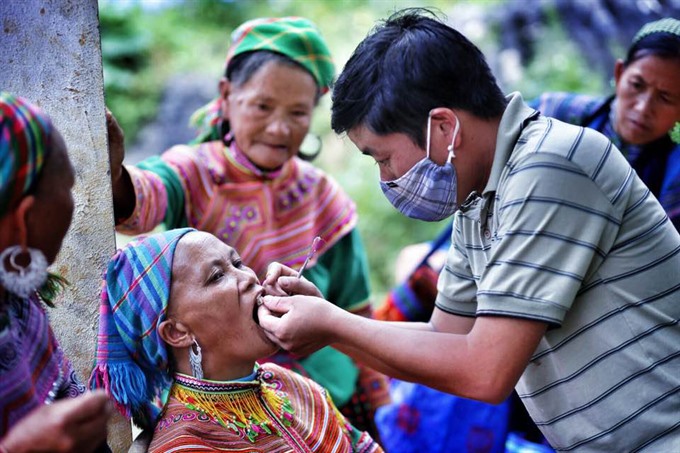 Society
Society

Sustainable long-term, community-based care that provides health care, nursing care, housing and livelihood support for the elderly is vitally important for Việt Nam and other countries with aging populations, experts said yesterday (august 15) at a forum held in HCM City.
 |
| Exhibitions and performances organised by the Japan External Trade Organisation showcased Japan’s latest innovations in elderly care-related products and services and the promotion of healthy aging. –VNS Photo Gia Lộc |
HCM CITY – Sustainable long-term, community-based care that provides health care, nursing care, housing and livelihood support for the elderly is vitally important for Việt Nam and other countries with aging populations, experts said yesterday at a forum held in HCM City.
Keizo Takemi, a member of the House of Councillors in Japan, said the elderly should live the remainder of their lives in an environment familiar to them, even if they need long-term care.
“As the number of elderly with dementia is expected to increase, creation of an integrated community-care system is important,” he said. “It’s necessary for municipalities and prefectures that serve as insurers to create an integrated community care system based on regional autonomy and independence.”
Dr Peh Kim Choo, chief executive officer of Tsao Foundation and director of the Hua Mei Centre for Successful Ageing in Singapore, said there was a need for a “paradigm shift in how the role of the elderly is envisaged as well as how services can be designed from the public and private perspectives”.
“One important role we have is joining the dots, acting as the catalyst in creating an integrated community-care system and interfacing with the health and social care system, which is largely driven by the Government in Singapore,” she added.
Also speaking at the forum, Prof Du Peng, director of the Institute of Gerontology at Renmin University of China, said that most long-term care services in China were operated by public institutions.
Nursing homes have more than 7.3 million beds, but nearly half of them are not used, he said, adding that extension of care services to the communities is one direction of reform.
“China has learned from previous community-care programmes and has been trying its best to establish a long-term community care system both in urban and rural areas. The facilities are easier to establish, but the operation needs sustainable input and management,” he added.
Sustainable long-term care in communities also depends on qualified human resources and the integration of government agencies, according to Du.
Rural aging is more serious than in urban settings, with long-term care services mainly occurring in cities, and an increasing gap between rural and urban care systems.
Việt Nam’s Minister of Health Nguyễn Thị Kim Tiến said that aging populations were one of the biggest demographic changes occurring worldwide.
The number of people over 60 is expected to increase from more than 900 million in 2015 to 2 billion in 2050, according to the World Health Organization (WHO).
“This great demographic transition brings great opportunities but also big challenges, affecting all socio-economic aspects of every nation, all APEC-member economies, every community and each family,” she said.
Việt Nam is among the countries with the fastest aging rate, with 10.1 million aged 60 and above, accounting for 11 per cent of the total population. The figure is expected to increase to 18 per cent by 2030 and to 26 per cent by 2050. Currently, there are 2 million people aged 80 or more in Việt Nam.
Opportunities
As set out in sustainable development goals, universal health coverage is essential to ensuring healthy, active lives for everyone, regardless of age.
Coordination between the public and private sector, including civil society, is critical in incorporating innovative approaches and technologies to address the challenges ahead, experts said.
Despite challenges, socially and economically active and healthy older people make significant contributions to society. Harnessing the experience and potential of older people is essential to reap the benefits of an aging society.
Koji Fujimoto, deputy director general of the Office of Healthcare Policy of the Cabinet Secretariat in Japan, said that training for professional elderly care services, such as functional recovery care, should be improved as the need for more qualified staff would increase.
Economic ties among industries related to elderly care should also be created, Fujimoto said.
At the forum, 20 panel exhibitions as well as stage presentations and performances, organised by the Japan External Trade Organisation, showcased Japan’s latest innovations in elderly care-related products and services and the promotion of healthy aging.
The forum, organised on the sidelines of the upcoming APEC’s 3rd Senior Officials Meeting (SOM), promoted collective action on a regional policy framework for aging issues. – VNS
 |
| A woman from an ethnic group has her teeth checked at Cán Cấu Market in Si Ma Cai District, northern province of Lào Cai. — VNS Photo Việt Thanh |




